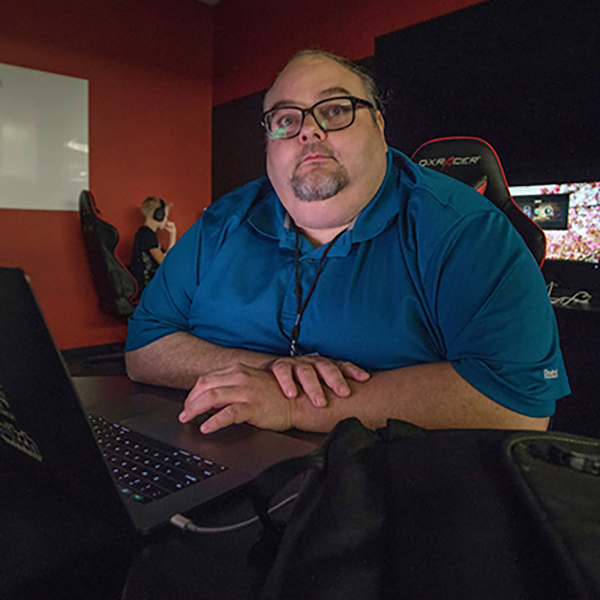Phill Alexander remembered as ‘a trailblazer’ in college esports
Assistant professor of Emerging Technology in Business + Design was a pioneer in esports curriculum

Phill Alexander MA ’07, a trailblazer in college esports credited with helping establish Miami University’s varsity esports program, died Monday at his home. He was 47.
As an assistant professor of Emerging Technology in Business + Design (ETBD) at Miami University, Alexander was a multidisciplinary scholar who brought together teaching and scholarship in rhetoric, game studies, Cherokee/Indigenous rhetorics, and digital media production.
He aimed to explore the stories that shaped lived experiences, focusing in particular on the experiences of gamers and of creators and users of digital media.
On Sunday, Miami University President Gregory Crawford awarded Alexander the President’s Medal during a small ceremony at his bedside with his wife, Julie, an assistant teaching professor in the Farmer School of Business, and colleague Heidi McKee, professor of English. The medal honors his extraordinary and impactful service.
“Phill Alexander was a visionary whose leadership in collegiate esports extended far beyond Miami,” President Crawford said.
Miami University Provost Elizabeth Mullenix said that during her time as dean of the College of Creative Arts, she had the privilege of working closely with Alexander and witnessed his passion for education and innovation firsthand.
“He was key to establishing our program in Games and a trailblazer in collegiate esports. Phill was a kind, collegial, collaborative colleague, and I know that his impact will continue to be felt at Miami," Mullenix said.
A scholarship created in his honor, The Professor Phill Alexander Memorial Fund, will support students interested in Game Studies at Miami.
Family, friends, and colleagues are planning a celebration of Alexander’s life to be held at Miami in the spring. His obituary is posted on the Stegall-Berheide-Orr Funeral and Cremation Service website.
Ryan Fisher, dean of the College of Creative Arts, said in an email to colleagues that Alexander’s innovative courses and pivotal role in launching the Master's in Esports Management have left an enduring legacy within the College of Creative Arts.
“Phill's enthusiasm and leadership extended far beyond academics,” Fisher said. “His efforts positioned Miami as a national powerhouse in esports, earning championships, widespread recognition, and the admiration of countless students and colleagues.”
Michael Bailey-Van Kuren, chair and associate professor of ETBD, called Alexander a pioneer in esports curriculum development.
“He taught the first documented collegiate course on esports and introduced the first class ever on Esports Broadcasting,” he said. “His groundbreaking work has not only transformed Miami’s academic offerings but also provided invaluable learning experiences for hundreds of students.”

Alexander earned his Master of Arts in English from Miami in 2007, serving as the graduate assistant director for digital writing, helping to integrate digital technologies in first-year writing. He earned his doctorate in Rhetoric and Writing from Michigan State University in 2012.
McKee, who was Alexander's thesis advisor and then became his colleague when he joined Miami in 2012, reflected on his impact.
"From his first days at Miami as a graduate student and then as a professor, Phill has always centered student learning, helping to create opportunities for students to grow and learn with new technologies. He was such a collaborative and engaged colleague."
Alexander taught 16 different courses at Miami, including courses he created such as Rhetoric of Digital Identity, Writing for Games, and Esports Streaming & Broadcasting, McKee said.
“Dr. Phill,” as he was affectionately known, collaborated with the Armstrong Institute and two students — Stelanie Tsirlis ’16 and Matt Samuelson ’18 — to co-found and co-direct the varsity esports program in 2016.
The program was the seventh of its kind globally and the first at a school offering postgraduate degrees and Division I sports, Bailey-Van Kuren said.
In a 2018 Miami news feature, Game On: Esports maintains a growing presence at Miami, Alexander said research shows there are more young people from ages 14 through the mid-20s who watch the gaming channel Twitch more than television. And, he added, they are more interested in games than traditional sports.
“One of the things we have realized is the way to reach out to that generation and to meet them where they want to be is to come into this space,” he said.
By 2020, Alexander was engaging with the Mid-American Athletic Conference, ultimately leading to the creation of the Esports Collegiate Conference (ESC), the first collegiate esports conference in the world.
A board of directors was established consisting of the presidents of its 14 member schools, with President Crawford serving as chair.
Alexander’s efforts in creating the Esports Collegiate Conference “united institutions across the region and set a global standard for excellence in this field,” President Crawford said.
Alexander’s leadership in collegiate esports helped drive the program’s exponential growth on campus, making him a national figure in the field, Fisher noted.
Alexander was the author of several books, including “Identity and Collaboration in World of Warcraft” (2018) and “Esports for Dummies” (2020).
On his professional website, he called himself a “storyteller by nature and a teacher by trade.” He also wrote, “I’m also a teaching Swiss Army Knife. Tell me what you need, and I’ll build it.”